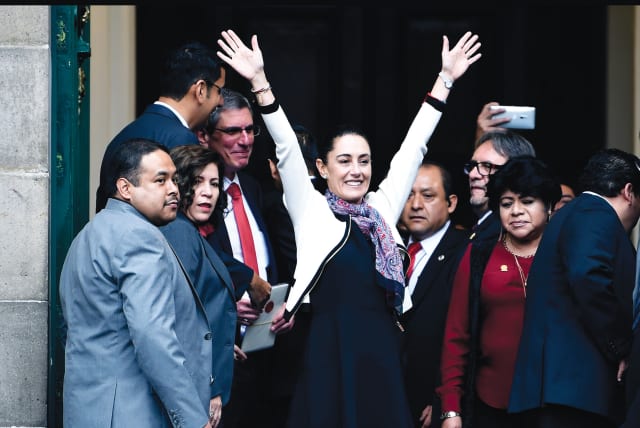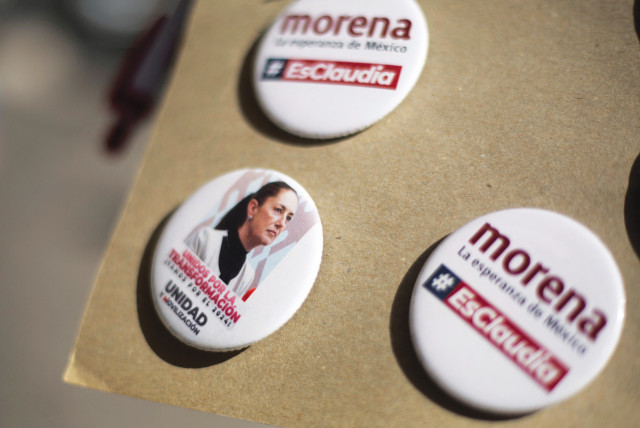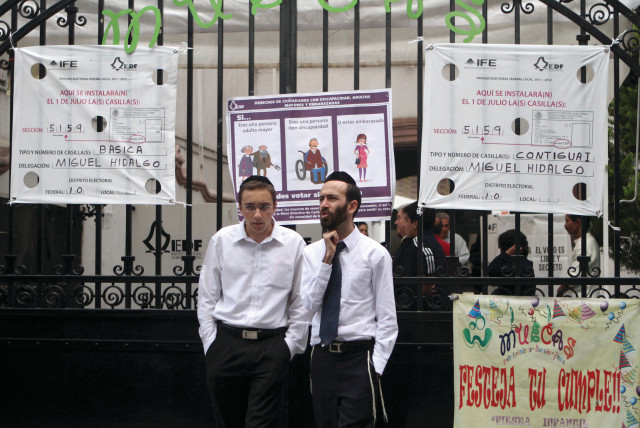Who is Mexico's Jewish presidential candidate: Profiling Claudia Sheinbaum

The Jewish community, they are closely following this historic moment and hope it won’t have negative side effects on their own lives.
When Sharon Mustri was in grade school in Mexico, a classmate confided that one day she planned to become the future president of Mexico. That same day Sharon went home and told her parents about this friend and her grand dreams.
Her parents smirked, laughed, and said, “Do you really think that your friend will become president?” Sharon responded, “Why not?” Her parents reasoned that “First off, she’s a woman; and second, she’s a Jew. She will never become president of a country like Mexico.”
These days, to the consternation of Mustri’s parents and others, Claudia Sheinbaum, another Jewish woman with a commanding lead in the polls may well ascend to Mexico’s highest office.
However, beyond the excitement and anticipation surrounding the momentous possibility of Mexico acquiring its first Jewish leader and female president, a quiet undercurrent of fear is rippling through the nation’s Jewish community.
In a land where the rich tapestry of culture and history often overshadows the Jewish heritage, many wonder what the future holds if Sheinbaum takes the reins. This is a story of pride, apprehension, and a community grappling with the unknown.
Around a warm Shabbat table in the heart of Mexico City, where the aroma of freshly baked challah and the comforting chatter of friends and family filled the room, the conversation turned to the current extraordinary moment in the nation’s history. Here, amid the camaraderie, there was a palpable sense of concern as the topic shifted to presidential candidate Claudia Sheinbaum.
As the Shabbat candles flickered, the esteemed family members leaned in to share their concerns in hushed tones, pondering Sheinbaum’s connection to her Jewish heritage and the potential impact on a community deeply ingrained in tradition. In this intimate setting, the political stage was discussed, and it became clear that Mexico’s future hung in the balance.
“Although Claudia Sheinbaum is Jewish, she does not share the same political views as most of Mexico’s Jewish population,” a rabbi at the table said.
Who is Mexico's Jewish presidential candidate?
FORMER Mexico City mayor Claudia Sheinbaum is leading the polls with double digits in the run for presidential office. In 2018, she made history when she was elected the first Jewish mayor of Mexico City. Since then, her popularity has surged, leading her to step down from her mayoral role in pursuit of a presidential nomination within her party.
The 61-year-old Sheinbaum was born in Mexico City to Mexican parents, but her grandparents came from Europe. In the 1920s, one set of grandparents, identifying as Ashkenazi Jews, emigrated from Lithuania. Two decades later, in the 1940s, her other grandparents, Sephardi Jews, went to Mexico from Bulgaria.
While unaffiliated with any Jewish organization or synagogue in Mexico, Sheinbaum, who defines herself as not connected to Judaism and not practicing it, recalls celebrating the Jewish holidays with her family during her childhood.
Addressing a gathering of Jewish women in 2018, she expressed pride in her heritage, saying she’s proud of those origins while reminiscing about her upbringing, noting, “We celebrated all the holidays at my grandparents’ house,” and sharing several fond memories connected to those occasions.
Mexican-Jewish news outlet Enlace Judio published excerpts of Sheinbaum’s speech in 2018.
“Both my last names [Sheinbaum and Pardo] are of Jewish origin,” she said. “My paternal grandparents emigrated from Lithuania, and my maternal grandparents were Sephardi, from Bulgaria,” she pointed out.
In an interview earlier this year, Sheinbaum’s mother, biologist Annie Pardo, considered it possible that her daughter would become president of the country in 2024.
“Claudia is evidently in a position where she could be the first [female] president of Mexico. It is easy for me to say, but this has been the product of hard, constant work, and dedication,” Pardo told La Jornada.
Mexico and Judaism
MEXICO IS a country rich in culture and history, but a majority of its citizens are unfamiliar with Judaism. Its official Jewish community makes up less than one percent of the population. Most of the antisemitism that is experienced in the country stems from a lack of knowledge, with a vast majority of Mexicans unfamiliar with Jews and their customs. Some Mexicans believe they have never met a Jew before. The Holocaust is not taught in Mexican public schools, nor do there appear to be any plans to make it part of the curriculum. Currently, the Holocaust is only taught in Jewish schools.
Mexico is home to approximately 40,000 Jews, making it the 14th-largest Jewish community globally as of 2020, according to the World Jewish Congress (WJC). The community is known for its strong traditionalist values, encompassing various denominations and ethnicities, from Orthodox to Conservative and including Ashkenazi, Sephardi, and Levantine Jews. It is recognized as one of the most active Jewish communities worldwide.
The Magazine reached out to three senior rabbis in Mexico City to ask them how they felt about Sheinbaum’s chances of becoming president. They felt nervous about discussing the subject, since she has amassed most of the votes and is likely to win the election.
Mexican rabbis are concerned about Sheinbaum
However, the consensus among these rabbis, who spoke off the record, is that Sheinbaum wasn’t affiliated or connected with any Jewish community, so they view her “as a person who does not hold the Jewish people’s interests at heart.”
One rabbi said, “Although Claudia Sheinbaum is Jewish, she does not share the same political views that most of Mexico’s Jewish population have.”
Another rabbi in Mexico City said he was worried that antisemitism would increase in Mexico because of Claudia Sheinbaum running in the political race.
The rising fear in the Jewish community is that Mexicans who are against her Morena party might make antisemitic remarks in an effort to try to diminish Sheinbaum and bring her down. Another fear among the Jewish community is that if she becomes president and doesn’t fulfill her promises to her voters, then “the voters will blame the Jewish population for her actions,” one of the rabbis said.
Ilan Arditti, a Mexican TV and radio broadcaster, told the Magazine that as a Mexican Jew, “I feel deeply ashamed to have a representative from the Jewish community who has never been closely connected to our religion.
“It would be a disgrace if a woman like her, who represents Morena, the right-wing party that is undermining democracy in Mexico and slowly pushing us towards socialism, would become the first female president of our country,” he said, harshly.
“It’s crucial for the world to know that Morena is the party responsible for deceiving the population, embezzling funds, leaving us without essential medicines, and making our nation increasingly resemble Cuba or Venezuela. The narco-cartels have never been more entwined with the government than they are now,” he concluded.
Sharon Mustri, a new immigrant to Israel from Mexico, agreed with Arditti that Sheinbaum’s candidacy isn’t good news for the Jewish community.
“In a normal situation, I would feel proud that a Jewish woman is about to come to power, but instead I feel fear and sadness, since during her term as mayor she has made many mistakes and belongs to the party that is leading Mexico to ruin.”
FOR SHEINBAUM, who held the distinction of being the first female and Jewish mayor of the capital city, discussing her Jewish heritage in public was a rarity. Much like many other liberal and secular Jewish politicians worldwide, she seldom publicly identified herself as Jewish. Despite receiving considerable attention in the Jewish media, her connection to her Jewish identity remained somewhat distant.
In a 2018 profile on Sheinbaum the Jewish Telegraphic Agency stated that she had “no formal relationship with Mexico’s institutionalized Jewish community” and that she “has never taken a political stance from an overtly ‘Jewish’ perspective.’” It said that “she hasn’t made any public pronouncement about Israel or spoken as a member of a minority, even though Jews make up far less than one percent of the capital city’s population.”
Nevertheless, “her identity still complicated her rise to her powerful new post,” JTA wrote.
Miguel Steuerman, director of Radio Jai, the most popular Jewish radio station in Latin America, told the Magazine this week that “the Jewishness of a candidate who has not had an active and explicit commitment to Jewry and to Israel can often work against Jewish and Israeli interests, since most are afraid of being pigeonholed as pro-Jews or Zionists.”
According to Steuerman: “This may be the case of Claudia Sheinbaum, who has never denied her status but has not shown particular interest in it either. On the other hand, she represents the current ruling party of President Andres Manuel Lopez Obrador, which identifies with left-wing populist lines always close to the Palestinian and anti-Israeli causes.”
In his opinion, it would have been much better for the Jewish community if there were a “non-Jewish candidate with a strong commitment to Israel and Judaism from their evangelical faith or ideological conviction.” He gave an example of President Enrique Pena Nieto of Paraguay or Javier Milei, the colorful right-wing presidential candidate in Argentina.
JUST THE fact that Sheinbaum is a presidential candidate has already caused antisemitic tropes to arise, Former president Vicente Fox called Sheinbaum a “Bulgarian Jew” in an apparent attempt to minimize her candidacy. “The only Mexican is Xóchitl,” Fox added, referring to Sheinbaum’s opponent Xóchitl Galvez. That Sheinbaum and Galvez are women up against each other to become Mexico’s first-ever female president is a powerful message to the international stage that Mexico is preparing for a big change.
The antisemitic remark prompted Sheinbaum to upload her birth certificate, for a second time, to X (formerly Twitter), showing that she truly was born and raised in Mexico: “Stop your speculations, here is my birth certificate again. I am 100% Mexican, proudly the daughter of Mexican parents,” Sheinbaim tweeted.
She has also published campaign ads emphasizing her Mexican identity, in the face of attacks about her origins.
Gálvez condemned Fox’s comments, and Fox later apologized, writing, “I have a profound respect for the Jewish community.”
In the many conversations the Magazine held with community members, Jewish Mexicans shared that they are currently unhappy with the Morena government and assume that Sheinbaum will continue to follow the ideas and path of current President Lopez Obrador. The fact that Sheinbaum is Jewish does not necessarily mean that the Jewish population in Mexico will vote for her.
Politically, what separates Sheinbaum from her predecessors is that she is outspoken when it comes to climate change and finding solutions to provide clean renewable energy that is self-sustaining and efficient.
However, with Mexico’s long history and culture of machismo (strong, aggressive masculine pride), the fact that the country is open to the idea of having a female president is extremely modern – and for some, even shocking.
As for the Jewish community, they are closely following this historic moment and hope it won’t have negative side effects on their own lives.
Zvika Klein contributed to this article.
Jerusalem Post Store
`; document.getElementById("linkPremium").innerHTML = cont; var divWithLink = document.getElementById("premium-link"); if (divWithLink !== null && divWithLink !== 'undefined') { divWithLink.style.border = "solid 1px #cb0f3e"; divWithLink.style.textAlign = "center"; divWithLink.style.marginBottom = "15px"; divWithLink.style.marginTop = "15px"; divWithLink.style.width = "100%"; divWithLink.style.backgroundColor = "#122952"; divWithLink.style.color = "#ffffff"; divWithLink.style.lineHeight = "1.5"; } } (function (v, i) { });


